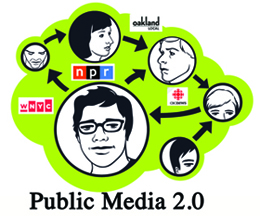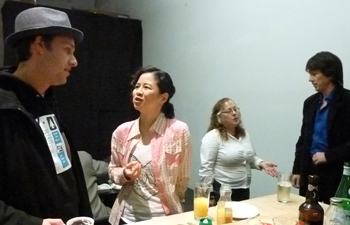5Across is sponsored by Carnegie-Knight News21, an alliance of 12 journalism schools in which top students tell complex stories in inventive ways. See tips for spurring innovation and digital learning at Learn.News21.com.
While most people think of public media as being government-funded broadcasters such as NPR, PBS, BBC and CBC, the definition is being expanded to consider public-serving new media. So that might also include new non-profits such as ProPublica, Oakland Local or Bay Citizen, who all are looking to serve the public as a mission that is more important than making money. But how are these new entities — as well as the old guard in public media — going to evolve in the digital age? How will they cope with a public who programs their own media experience and gets news on their mobile phones or with tablets? And what about the segment of the public that’s not wired, who live on the other side of the digital divide?
So for this month’s episode of 5Across, I brought together people involved in various aspects of local public media, from the popular radio/TV station KQED to the rising startup Oakland Local. We talked about the efforts to defund public broadcasting, how more startups are turning to collaboration and partnerships, and how pay rates are changing. And we discussed how to reach people on their mobile phones — even those people who are on “crappy cell phones.” Check it out!
5Across: What’s Next for Public Media?
Guest Biographies
Nato Green is a San Francisco native and underachieving Huffington Post blogger, was recently named the SF Weekly’s Best Comedian of 2010 for putting on “legendary” shows that keep audiences “doubled over.” The East Bay Express wrote that his sold-out comedy tour Laughter Against the Machine was “the brainiest, most literate comedy tour… it’s smart, it’s heady, it gets to the very edge of what’s tolerable.” Nato is the creator of Iron Comic, the Iron Chef-spoofing hit comedy game show that packed houses at SF Sketchfest three years running and the Bridgetown Comedy Festival 2010.

Queena Kim is the community editor of the Bay Citizen, a non-profit news site covering the San Francisco Bay Area. She worked at KPCC, Southern California’s leading NPR-affiliate, where she helped start up its highly successful arts and culture show “Off-Ramp.” As a reporter and co-producer of the show, Queena has done hundreds of stories on subjects ranging form a historic 10 Theremin concert at Disney Hall to animal sacrifices at a local Botanica. Queena also co-produces a pop + tech program called CyberFrequencies, which continues to air on KPCC and Sirius/XM. Queena has written for various publications including the Los Angeles Times, Modesto Bee and the LA Weekly.
Susan Mernit is editor and publisher of Oakland Local, a news and community hub for Oakland, Calif., focused on social justice issues that combines reported stories with community media and diverse voices and training to bridge the digital divide. A former VP at AOL and Netscape, and a former Yahoo senior director, Mernit is also a circuit rider for the Knight Community Information Challenge and a frequent facilitator for the Knight Digital Media Center. She is also a consultant focused on local media, community engagement and the future of news.
Matthew Meschery is the director of digital initiatives at the Independent Television Service (ITVS) where he oversees the development of new media content as well as ITVS’ digital activities. He specializes in developing scalable and replicable cross-media strategies and technological solutions for filmmakers and arts organizations. Matthew is one of the prime architects of an internal initiative at ITVS to support independent filmmakers creating original online content as well as new media extensions of their documentary films that are broadcast on public television in the U.S.
Tim Olson, is vice president of digital media and education at KQED Public Media, overseeing all web, mobile, and interactive applications for KQED San Francisco, KTEH San Jose and KQET Monterey and KQED.org. Tim was recently Chair of the Board of the Integrated Media Association, an industry group whose mission is to harness the power of the Internet and other new media platforms for the benefit of public broadcasters. Tim consults to a number of organizations in and outside public broadcasting including the CPB, PBS and NPR. Prior to joining KQED, Tim was interactive director for five years at KCTS Seattle, and before that, he oversaw all web operations at WTTW Chicago.
If you’d prefer to watch sections of the show rather than the entire show, I’ve broken them down by topic below.
Defunding Public Media?
Collaboration and Partnerships
What’s the New Pay Grade?
The “Stupid” Question
Going Mobile
Credits
Mark Glaser, executive producer and host
Corbin Hiar, research assistant
Charlotte Buchen, camera
Julie Caine, audio
Location: Vega Project & Kennerly Architecture office space in San Francisco
Special thanks to: PBS and the Knight Foundation
Music by AJ the DJ
*****
What do you think? What do you think about the future of public media? How should it evolve to keep up with new technology? Share your thoughts in the comments below.
Mark Glaser is executive editor of MediaShift and Idea Lab. He also writes the bi-weekly OPA Intelligence Report email newsletter for the Online Publishers Association. He lives in San Francisco with his son Julian. You can follow him on Twitter @mediatwit.
5Across is sponsored by Carnegie-Knight News21, an alliance of 12 journalism schools in which top students tell complex stories in inventive ways. See tips for spurring innovation and digital learning at Learn.News21.com.

